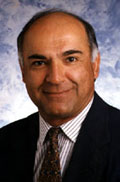|
Plenary Lecture
Issues and Opportunities in
Sustainable Fuel and Vehicle Technologies

Professor M. Ehsani,
Ph.D., P.E., F. IEEE, F. SAE
Robert M. Kennedy Professor and Director,
Advanced Vehicle Systems Research Program
Department of Electrical and Computer Engineering
Texas A&M University
College Station, TX 77843-3128
USA
Email: ehsani@ece.tamu.edu
Web Site:
http://www.ece.tamu.edu/People/bios/Ehsani.html
Abstract: The ever expanding use of personal vehicles in the world is
associated with the following major problems.
-
Fuel Consumption: Most vehicles require
liquid fuel, typically derived from petroleum, which is a finite
resource. Worldwide petroleum production is expected to decline starting
in 2004 (Deffeyes, Hubbert’s Peak). The engines in current vehicles are
only about 15–20% efficient.
-
Pollution: In cities, the tailpipe emissions
of vehicles degrade air quality. Also, the combustion of fossil fuels is
implicated in global warming. In the United States, 20% of carbon
dioxide emissions come from automobiles and 10% from trucks (http://www.ecobridge.org/content/g_cse.htm).
These problems with vehicles have long been known. There has been
substantial progress in reducing tailpipe emissions using advanced catalytic
converters; however, air quality is still unacceptable in many cities,
primarily due to vehicle emissions.
Unless we take a revolutionary approach, the problems with vehicles will
only get worse. By 2050, the number of vehicles is expected to increase by 5
times. Currently, the world has 9 people per vehicle, but by 2050 it is
expected to have 2.6 people per vehicle.
In this key note presentation, new technology trends of the present and near
future will be presented, leading to the need for a viable automobile and
fuel technologies that are sustainable. I will propose an integrated
approach to the automobile that focuses both on fuel production and vehicle
power train technologies. The result is a new automobile and energy industry
with the following properties: sustainable fuel supply into the indefinite
future, higher efficiency, better performance, and no net carbon dioxide
emissions to the atmosphere.
I will also review some of the technical, commercial, and social problems
and issues that are on the forefront at the present. The presentation will
conclude with comments about the technical realities versus the public
knowledge of these issues.
Brief Biography of the Speaker:
M. Ehsani has been a researcher, consultant, and educator in energy systems,
power electronics, and automotive systems over the past 33 years. He is the
author of over 300 publications, 12 books, 23 patents, and numerous
published reports and articles on the above topics. He has also served as a
consultant to over 60 companies and many government agencies around the
world.
He has been recognized on numerous occasions internationally for his
technical contributions and has won many IEEE, SAE, government, and
industrial awards and honors, such as IEEE Vehicular Society 2001 Avant
Garde Award for “Contributions to the theory and design of hybrid electric
vehicles.”
He is Robert M. Kennedy endowed chair professor of electrical engineering at
Texas A&M University, in College Station, Texas, and has also been named the
Halliburton Professor, Dresser Industries Professor, BP Amoco Faculty, and
Ruth & William Neely/ Dow Chemical Faculty Fellow in the same university.
In 2003, he was selected for the IEEE Field Award for Undergraduate Teaching
“For outstanding contributions to advanced curriculum development and
teaching of power electronics and drives.”
He is a Fellow if IEEE (1994) and a Fellow of SAE (2005) and has served in
many leadership positions in both of these professional societies. Presently
he serves on the AdCom of IEEE Power Electronics Society, and Board of
Governors of IEEE Vehicular Technology Society. We was the founding chairman
of the IEEE Vehicle Power and Propulsion Conference Steering Committee.
Ehsani is a registered Professional Engineer in the State of Texas.
|